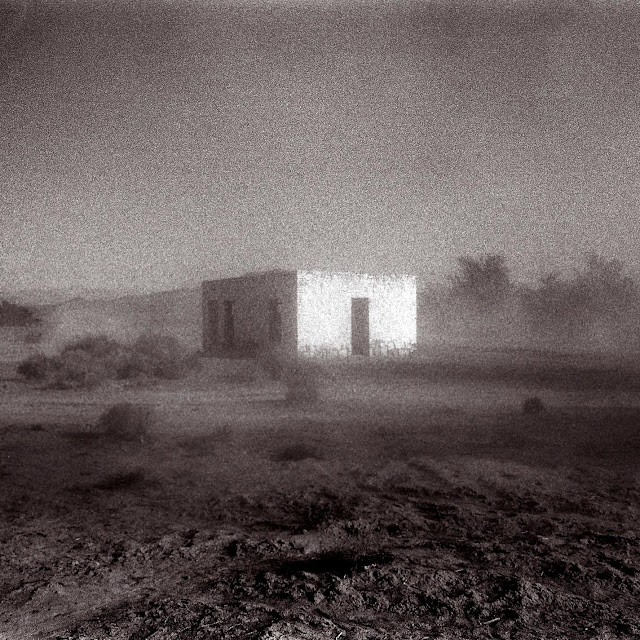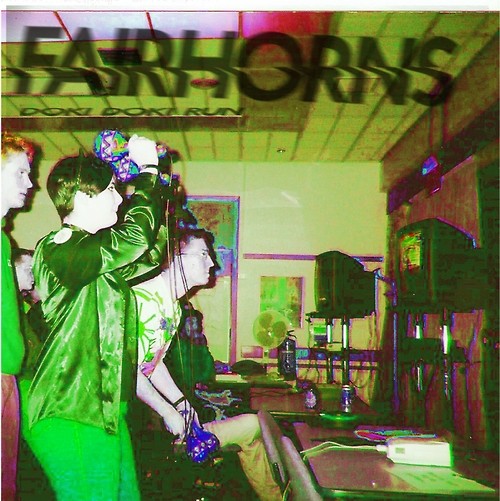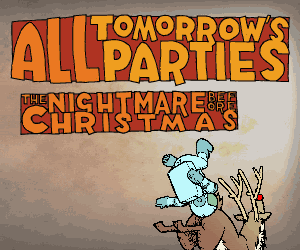
Ron's first out, tinkering away to the tune of an abridged medley of some of Sparks' more recognisable works. Akin to demented polyphony, it's all a little like Chaplin honky-tonk with Mael seemingly possessed by the weatherbeaten spirit of New Orleans, Louisiana. It's unconventional, and emits a zany current of eccentricity that clambers, only to then cascade the length of the spinal cord. And some are more visibly wired in than others: every other bod in the Barbican sports a Sparks tee, and many cart some limited 10" or other about, ergo offering an impression of a fanclub convention of sorts. But the two hands of the first Mael materialised are those of a New Wave relic; a sorcerer to be revered. It's only once brother Russell emerges that things take a turn for the decidedly weird.
Indiscreet opener Hospitality On Parade gets translated to something so schmaltzy; so sweet that it borders on the pantomimic. It's slightly horrid, and is patently not one to be recited with just the one voice. But more alarmingly, it signals the arrival of one of the more unwatchable performers I've yet to have the misfortune of witnessing. Russell prances around like a loon loaded on Prozac overdosing on proto-punk for the very first time, making excruciating gesticulations to his brother at his every opportunity. "He's special, So Special" he'll warble operatically, simultaneously thrusting an enthused forearm in the spotlit direction of his sib stage-right. It's the stuff of amateur dramatics; an arts centre musical even, and it's substantially more dramaturgical than anything going on next door.
Once this flamboyance settles down ever so slightly, and establishes itself as Mael's unerring modus operandi then if Michael Clark's New Work 2012 were unorthodoxly stimulating, his flouncy mannerisms become purely amusing. He resembles a portly Patrick Wolf; a stiff toff in Countryside Alliance costuming. And his voice is all but savaged by the distracting hiss of reverb on Metaphors. Russell here assumes the role of Bowie impersonator, foisting his pelvis on the thick air before it and whilst one many may d-i-g dig dig on record, it's a somewhat unwelcome oddity tonight.
Sherlock Holmes fares rather better. It longs for its Watson – its syncopated rhythms and stuttering bass – as it is instead overly seasoned with the overtly saccharine, as Russell sings not so much "like Sherlock Holmes" as Devendra Banhart, his nerdish enunciation offset of course only by keys prodded with an almost analytical precision. Ron's Gestapo tache and tutor-like stillness remain, although so plodding is his piano that even the author of oeuvres as unapologetically abnormal as Never Turn Your Back on Mother Earth and Dick Around are rendered rather limp and deficient in both alternative dimension and definition.
Good Morning is chirruped with Disney glisten, although it ain't exactly gold as Russell's dubious falsetto recalls an incandescent Martyn Jacques and indeed there's more than a mere pale reflection of his Tiger Lillies in many of these reworkings. The falsetto/ honky-tonk combo arguably isn't a surefire one-two geared toward incontestable success and by the time of a gently Lynchian Under The Table With Her, it has already gotten to sounding quite dreary. Indeed intriguingly, despite the evident avidity of those here congregated, and the fraternalism of those they're here to commend if nothing else there's an apparent disconnect between Ron and Russell, and moreover between us and them. The former is epitomised by their contrasting stances – the frolicking of one; the complete inertia of the other – whilst the latter is typified by a general disinterest. And this is an utter inescapability.
The show is, above all else, repeatedly irritating. And there's little to stir us from this all-pervasive insouciance. It therefore seems strangely apt that the numbingly repetitive, prototypal R'n'B of My Baby's Taking Me Home be one to startle. As with the moment "a rainbow forms", it's an inconsequential revelation that, although it could again benefit from a fuller fleshing-out (gospel singers, cymbals, and so forth) emerges glorious as our sun unsheathed. Russell's voice is as though broadcast indirectly in from '02 across a splintered frequency modulation, and even his histrionic gesturing does little to detract from its mantric duplicity. Composed of only five words and a spoken word interlude, it's a cunning wink of a track and one I'm more than happy to be hoodwinked by.
Speaking absent vocalists though, Singing in the Shower is disrobed to the point of the undignified, the '89 single transmuted into a residual clump of Bolshevik plonk that, needless to say, finds itself desperately lacking in that other voice – that of avant-garde popstrelle française Catherine Ringer. As Russell booms out both vocal parts, it becomes woefully manifest as to who is the maestro, and dynamic generator of Sparks' more electrifying moments. Say, Beat the Clock, during which Ron will emerge from behind his clunky keyboard and motion ice skating shirtless across lower aisles, before returning to the stage, panting, though otherwise as nonplussed as a eunuch advanced upon by the most impish of London's uncountable hypersexuals.
It's during this encore – one centred around primitive, almost Playdo techno – that the rhythms and grooves lacking and bemoaned as such during a vexatious take on The Rhythm Thief return. They waved "auf Wiedersehen to the beat" the moment they embarked upon this tour. Yet the beats they now bash out are but wildly arpeggiated presets; presets triggered by Russell as the brothers swap arms. It's obviously a premeditated gimmick, and it's faintly humorous but at the same time it serves to undermine the synthpop magna opera of Ron to a degree, in exposing quite explicitly the simplicity of synth composition.
Simplicity can sometimes prove supreme, as it may on a foreseeably rambunctious This Town Ain't Big Enough for Both of Us that is rigorously clapped along, cultivating patches of standing ovation here and there as we incite the insatiable folly of Russell Mael. He howls like a gremlin dancing barefoot about a smouldering flame, mumbling incoherent incantations all the while before assuming the role of unhinged despot on a bloody odd Suburban Homeboy. It's like an autocratic rally with the greased hair, the stringent staccato chords, the white drapes, and that moustache. All clenched fists, Russell chants what almost sounds like Osama bin Laden. It's of course its title he's repetitiously blaring, but it makes for a discomforting malentendu all the same. Then there's When Do I Get To Sing My Way, which once sounded rather a lot like Neil Tennant's more louche sordid pop and here sounds a little more ingenuous; a little more like its Paul Anka-penned inspiration. Is it closer to heaven, or merely further from hell? Debatable. But it is at least palatable.
As, it ought to be reaffirmed, is much of tonight. If nothing else, it serves as a proficient homogenising of a discography spanning four decades, there or there abouts. It's more impressive than impactive in many respects and whilst such formatting lends itself to such coalescence of the back catalogue, the way in which the show is staged enhances this sense of the monotonous somewhat. It's all a bit one-trick; a little oompah without the band.
Although it's when they break with this regular that the irregularity Sparks channel becomes disproportionately unpleasant. The Wedding Of Jacqueline Kennedy To Russell Mael is one such instance: a discombobulating soliloquy during which Russell plays the part of a priest feigning the exchanging of vows down a telephone (here, his hand) when he should logically be the one professing his love for JFK's once beloved for reasons entirely illogical, it's fairly horrible. In its closing moments, he waltzes off down an imaginary aisle, arm in arm with nobody. Although that which follows – "four short excerpts" from '09 concept LP The Seduction of Ingmar Bergman that are, alas, nowhere near short enough – is implausibly worse. Ron, now on his feet and topped with a rather fetching beret, speaks of "a total disdain for escapist art" atop swooshes of the synthetic that sound spookily redolent of Zelda soundtrack. As he himself witters on, this is "escapist art of the worst sort" in its very essence and whilst he may relay Bergman's aversion to your average Hollywood Borebuster, there are moments during Sparks' latest live concept at which I feel "compelled, against my will, to stay for ninety... long... minutes."
That, in itself, is conclusive proof as to why Russell's bumptious affirmation of: "Two hands, one mouth/ That's all I need to satisfy you" rings somewhat untrue to my ears. Which is tragic, given how imperious they can be whilst occupying The Number One Song In Heaven.























